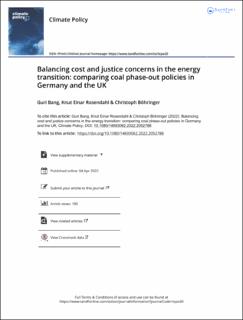Balancing cost and justice concerns in the energy transition: comparing coal phase-out policies in Germany and the UK
Journal article, Peer reviewed
Published version

Åpne
Permanent lenke
https://hdl.handle.net/11250/2998269Utgivelsesdato
2022Metadata
Vis full innførselSamlinger
- Journal articles [478]
Originalversjon
10.1080/14693062.2022.2052788Sammendrag
Europe’s two largest economies – Germany and the UK – are phasing out coal from electricity production as part of European efforts to fulfil increased climate policy ambitions that require comprehensive energy system transitions. German and UK governments varied in the ways they sought support from diverse societal interests to make the transition socially acceptable and politically feasible. Drawing on 22 expert interviews and process-tracing methods, this paper compares and explains how political and economic institutional differences influenced efforts to balance energy transition concerns, like speed and cost-effectiveness with justice for companies, workers and communities most adversely affected by the transition. We find that the increasing attention to just transition perspectives after the Paris Agreement affected the design of coal phase-out processes in different ways in the two countries. Just transition concerns were given priority by policymakers in Germany, but more so if they overlapped with the interests of incumbents. In the end, politically powerful stakeholders dominated the policy outcome. In the UK, policymakers and stakeholders gave only weak attention to just transition concerns, mainly because coal’s market position had collapsed. Coal interests did not have strong representation in the decision-making process. But we find that just transition concerns are likely to gain more attention in the UK because a more challenging transition away from gas will take place over the next two decades. Balancing cost and justice concerns in the energy transition: comparing coal phase-out policies in Germany and the UK
